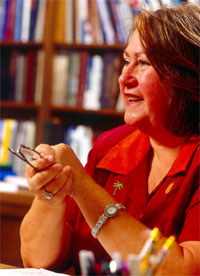
Nickerson began teaching paralegal courses in the evenings at a community college while she worked in a personal-injury litigation law firm. "I then was asked to teach a class at William Woods University. A year or so later, I was asked to teach half-time in the WWU program and then became a full-time faculty member about 13 years ago," said Nickerson. "When I began teaching half-time, I resigned from the law firm and began doing some freelance work setting up mock juries/focus groups for personal-injury litigation attorneys and doing some freelance domestic work for family law attorneys."
Nickerson said that she absolutely loves to teach and that she loves the law. "I have the best of both worlds...teaching law to both traditionally aged students and adult nontraditional students. Since I earned a graduate degree in library science with an emphasis in legal bibliography, I am the legal research instructor, and I really enjoy seeing the students' 'light bulbs' light up when they finally begin to think like legal researchers and find relevant statutes and cases to support their position."
"I receive gratification when my students find jobs they love and the attorneys who hire them rave about what assets they are to the practice. Many of my students have gone on to be crackerjack paralegals and, yes, lawyers."
|
"My life/work experience as being a basically 'nosey' person and a teacher gave me the characteristics that a paralegal needs," Nickerson continued. "I can work with all kinds of people, and being nosey allows me to be a persistent fact-gatherer, researcher, and client 'hand-holder' in addition to being cognizant of confidentiality issues."
Nickerson said that over the last 20-plus years, she has seen the paralegal profession grow in recognition. "When I used to have my students ask random people what a paralegal is, they would get responses that ranged from 'a handicapped person' (paraplegic) to a 'pretend lawyer.' Today, paralegals are recognized by the public as professionals who assist lawyers in providing services to clients."
In Nickerson's opinion, paralegal associations bring tremendous value to the community of paralegals. "Association with other paralegals can raise the standard of skills through networking and continuing education seminars. Associations also advance the profession through a kind of self-governance. Networking, learning, raising professionalism, and activism in guiding the profession are all important functions of professional associations," she said.
Nickerson said that she loves being a paralegal and would not change a thing if she had her career to do over. "I chose not to go to law school a long time ago," said Nickerson. "After all, I don't get called at three in the morning because the client's son got arrested for DWI!"
Portia LeFebvre, J.D., was a professor and colleague of Nickerson, and is the person she said influenced her significantly in her life and career. "She started out as a paralegal, then became a lawyer and paralegal educator. She had a love and excitement for the law and the profession that rubbed off on everyone around her," said Nickerson.
Nickerson's advice for students who are preparing to become paralegals is to be a professional both on the job and off the job, have a curiosity for everything, and be willing to be a lifelong learner.



